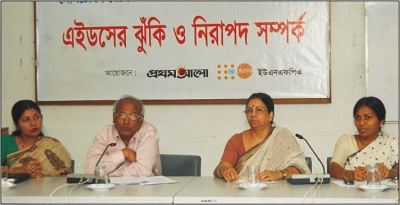HIV spreads in concentrated epidemic form among IDUs

Speakers at a roundtable titled 'Vulnerability of AIDS and safe relationship' at Biam auditorium in the city yesterday. Sitting from left are Afsana Taher, Director General of Health Services Dr Shahjahan Biswas, former adviser to the caretaker government Sultana Kamal and Dr Julia Ahmed. The Prothom Alo and UNFPA jointly organised the roundtable.Photo: STAR
Though HIV prevalence is less than one percent in the country, it has already spread as a concentrated epidemic form among the injection drug users (IDUs), said the speakers at a roundtable yesterday.
They said it is a must to increase awareness along with behavioural change and promote the use of condom among the adults as part of AIDS prevention.
The roundtable titled 'Vulnerability of AIDS and safe relationship' was organised jointly by the Prothom Alo and UNFPA at Biam auditorium in the city.
Terming the IDUs as most vulnerable group, Rebeka Sultana of UNFPA said around 57 percent of drug users have relationship with sex workers, who attend around 40 others in a week.
So they pose immense threat to spreading AIDS, she said.
Besides, as it has been found that some 42 percent of the IDUs are married, there is also the possibility of transmitting the disease to their wives, she added.
Rebeka said as sexual intercourse is the main route of HIV transmission in South Asia, use of condom should be increased in the country.
A study has revealed that 80 percent of AIDS infection takes place through sexual intercourse, she added.
" Though the demand for condom has increased, the supply is not at all adequate," said Julia Ahmed of Women's Health Coalition, adding that AIDS programme started in the country long time ago, but lack of sustainable leadership and ensuring enough condom to vulnerable groups hinders the advancement of the programme.
The speakers stressed the need for female condom as it can act as one of the tools of their empowerment and women can take their sexual decision by using it.
However, it needs reduction of the cost of female condom and capacity building of women before using it.
HIV/AIDS is also a health and socio economic issue and as such social steps to combat the disease need to be strengthened, said Sultana Kamal, former adviser to caretaker government, adding that raising awareness, supply of condoms and women's empowerment is also equally important in this regard.
" It needs coordinated efforts among the government and non-government organisations," she added.
While moderating the roundtable, Joint Editor of the Prothom Alo Abdul Quayum said there are around 11,000 AIDS patients in the country.
From this it can be assumed that the actual number of patient is far more than that as a large number of people do not expose it, he added.
"This also increases the chance of spreading the disease as other people cannot take any precautionary measures," said Quayum.
Director General of Health Services Dr Shahjahan Biswas, representatives of UNFPA and other non-government organisations and law enforcers shared their experiences and made recommendations at the roundtable.

 For all latest news, follow The Daily Star's Google News channel.
For all latest news, follow The Daily Star's Google News channel. 



Comments